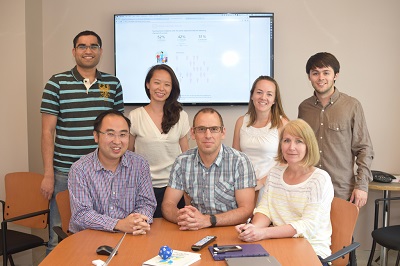Newsroom
Research project aims to improve end-of-life care in the community
mai 25, 2018
 Most people prefer to spend their last days of life at home surrounded by family and loved ones. For many, having the support they need starts with a discussion about what to expect. This often doesn’t happen.
Most people prefer to spend their last days of life at home surrounded by family and loved ones. For many, having the support they need starts with a discussion about what to expect. This often doesn’t happen.
Part of the challenge is talking about when a person will die.
Researchers from The Ottawa Hospital, Bruyère and the University of Ottawa have developed a web-based tool specifically for this need: it is called the RESPECT End-of-Life calculator. They are now refining and evaluating the tool before implementation in Canada.
What is RESPECT?
RESPECT End-of-Life is short for Risk Evaluation for Support: Predicting Elder life in the Community Tool for the End of Life. Technically, it is a predictive algorithm that calculates your survival (that is, how long you will live) based on 5 to 25 questions you answer such as what diseases you have and how difficult it is to care for yourself.
Who will use RESPECT?
RESPECT is for people or their caregivers who are uncertain whether they are approaching the end of their life. RESPECT can also be used by formal caregivers such as physicians, home care staff or palliative care teams.
What is unique about RESPECT?
RESPECT uses a personalized and patient-oriented approach made possible using big data.
“Personalized” means that the questions are detailed, specific and tailored – providing calculations that are customized to each person.
“Patient-oriented” means the calculator is designed for people and their caregivers (as opposed to doctors or nurses). Results are presented clearly, using terms that are easily understood. Calculations are performed in real-time as a person completes the questionnaire—giving people insight into how aspects of their health status affect their calculations.
Who is the team behind RESPECT?
 RESPECT was developed by a team of researchers at The Ottawa Hospital, Bruyère and the University of Ottawa, along with colleagues from across the country. The team is led by Dr. Peter Tanuseputro and Dr. Douglas Manuel, both scientists and family physicians who provide palliative care.
RESPECT was developed by a team of researchers at The Ottawa Hospital, Bruyère and the University of Ottawa, along with colleagues from across the country. The team is led by Dr. Peter Tanuseputro and Dr. Douglas Manuel, both scientists and family physicians who provide palliative care.
RESPECT has received support from the Canadian Institutes for Health Research Pan-Canadian SPOR (Strategy for Patient-Oriented Research) Network in Primary & Integrated Health Care Innovations Quick Strike program and the Centre for Aging and Brain Health Innovation.
How was RESPECT created?
RESPECT was developed using 1.3 million Ontario home care assessments that were followed to 124,000 deaths. This data is housed at the Institute for Clinical Evaluative Sciences. RESPECT will be part of www.projectbiglife.ca, which includes a series of tools that calculate the impact of an individual’s health behaviours on health outcomes. See overview video.
Can I try RESPECT?
The RESPECT web tool calculator is still being refined, but you can try it here: respect.projectbiglife.ca (after requesting a password). It is only available in English at this point.
Quotes
RESPECT focus group participant: "When I asked the neurologist [at the time of] diagnosis…are we looking at one year, five years, ten years?... he couldn’t tell me. My mom’s been sick my whole life, and [this is] the first time that someone’s ever given me a predict[ion].”
Dr. Peter Tanuseputro: “Many people have an idea of how they want to live the last months or weeks of their life, but their actual experiences often don’t match up with that ideal. We hope that by getting people to consider and discuss the possibility of death in realistic terms, we’ll be able to get closer to providing them with the kind of care they want.”
Dr. Douglas Manuel: “Both my parents died recently. My brothers, sister and I had considerable uncertainty about their needs and wants, even though I am a family doctor, palliative care provider and researcher! Hopefully a tool like this will help other families and care providers discuss and plan for better experiences around the end of life.”
Contacts
If you have feedback or questions for the research team please contact Dr. Tanuseputro, Principal Investigator, at 613-798-5555 extension 17343 or Carol Bennett, Epidemiologist at ext. 12443.
If you are a member of the media and would like to book an interview with Dr. Tanuseputro or Dr. Manuel, please contact Jennifer Ganton, Director, Communications and Public Relations, Ottawa Hospital Research Institute (Office: 613-798-5555 x 73325; Cell: 613-614-5253; jganton@ohri.ca).
The Ottawa Hospital: Inspired by research. Driven by compassion
The Ottawa Hospital is one of Canada’s largest learning and research hospitals with over 1,100 beds, approximately 12,000 staff and an annual budget of over $1.2 billion. Our focus on research and learning helps us develop new and innovative ways to treat patients and improve care. As a multi-campus hospital, affiliated with the University of Ottawa, we deliver specialized care to the Eastern Ontario region, but our techniques and research discoveries are adopted around the world. We engage the community at all levels to support our vision for better patient care. See www.ohri.ca for more information about research at The Ottawa Hospital.
Bruyère Research Institute
The Bruyère Research Institute supports investigators who contribute to a better, more responsive health care system that delivers the best care to patients and families. The Institute is a proud partner of Bruyère Continuing Care, the University of Ottawa and others and provides solutions to improve the health and health care of aging and frail Canadians. The Institute’s research focuses primarily on evidence, health system evaluation, brain health, geriatrics and rehabilitation, and primary care. www.bruyere.org/bri
University of Ottawa: —A crossroads of cultures and ideas
The University of Ottawa is home to over 50,000 students, faculty and staff, who live, work and study in both French and English. Our campus is a crossroads of cultures and ideas, where bold minds come together to inspire game-changing ideas. We are one of Canada’s top 10 research universities—our professors and researchers explore new approaches to today’s challenges. One of a handful of Canadian universities ranked among the top 200 in the world, we attract exceptional thinkers and welcome diverse perspectives from across the globe. www.uottawa.ca
